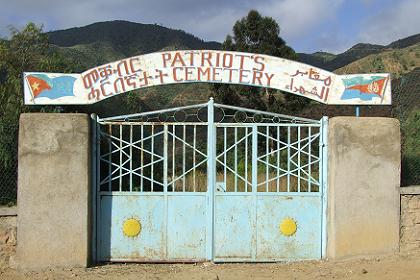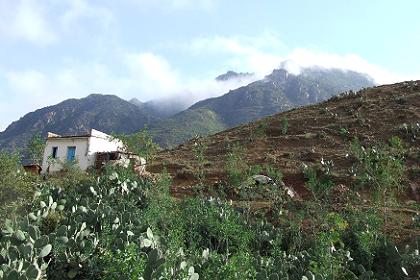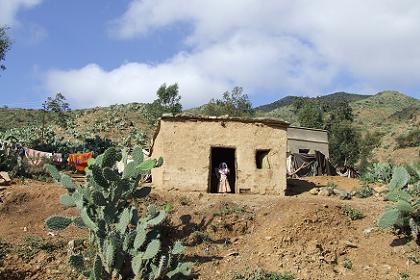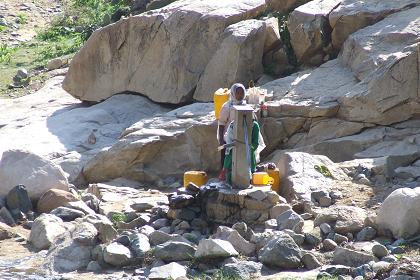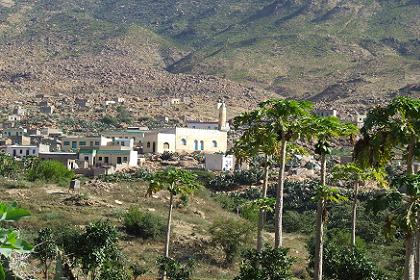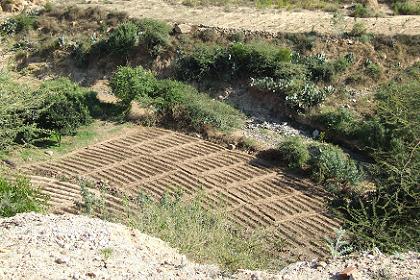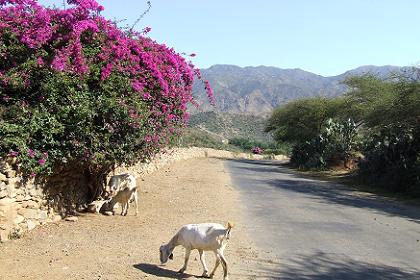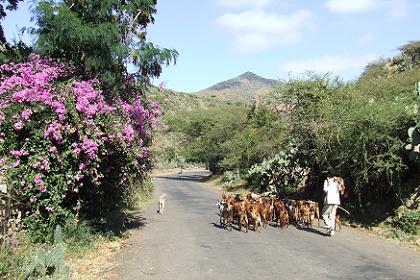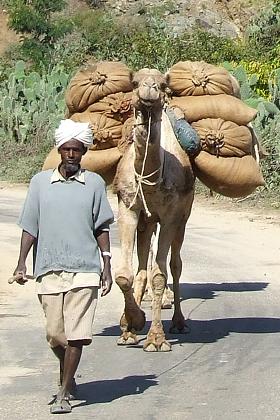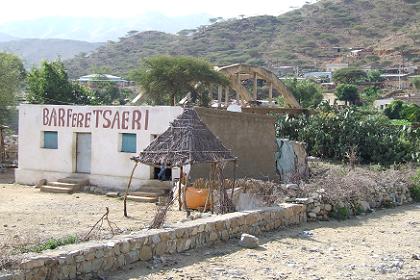| Eritrea November 2006 | ||||||
| Mon | Tue | Wed | Thu | Fri | Sat | Sun |
| 01 | 02 | 03 | 04 | 05 | ||
| 06 | 07 | 08 | 09 | 10 | 11 | 12 |
| 13 | 14 | 15 | 16 | 17 | 18 | 19 |
| 20 | 21 | 22 | 23 | 24 | 25 | 26 |
| 27 | 28 | 29 | 30 | |||
| Eritrea December 2006 | ||||||
| Mon | Tue | Wed | Thu | Fri | Sat | Sun |
| 01 | 02 | 03 | ||||
| 04 | 05 | 06 | 07 | 08 | 09 | 10 |
| 11 | 12 | 13 | 14 | 15 | 16 | 17 |
| 18 | 19 | 20 | 21 | 22 | 23 | 24 |
| 25 | 26 | 27 | 28 | 29 | 30 | 31 |
| next page | previous | |||||
| Touring
through Eritrea November and December 2006 |
||||||
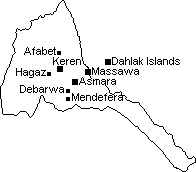 |
||||||
| Asmara
and surroundings November and December 2006 |
||||||
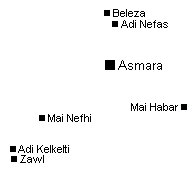 |
||||||
From Nefasit to Mai Habar - December 4th 2006
I take the early morning bus to Nefasit and ask the driver to stop where the road forks to Dekemhare. From here I will start my walk to Mai Habar, at a distance of about eight kilometers from Nefasit. The hike is easy, because the road is descending and nature is beautiful. And as I started early in the morning, the climate is mild, especially in December, when it is winter in Eritrea.
When I come closer to Mai Habar, plantations with oranges, lemons, tomatoes, zeitun, papaya and other fruits dominate the landscape on both sides of the road. Even the air smells fruity. There is almost no motorized traffic, only herds of goats, or a farmer with a packed camel or donkey. I greet them with "Selam". The answer is usually "Merhaba" (welcome).
People ask me where I am going. They confirm the direction of Mai Habar gesticulating with their hands. When I pass the technical school of Mai Habar, one of the students assists me to find the old peoples home. I ask him if there is a hotel in Mai Habar. He tells me there isn't any. This worries me a bit. It means I will have to continue my journey to Dekemhare today, or return to Asmara.
The student tells me I should not worry. He will arrange me a bed at the campus of the technical school. If necessary he will give me his bed for the night. When we arrive at the compound of the old peoples home, none of the women speaks English. The students translate my words in Tigrinya. The women make tea, served with delicious fresh hembesha, and ask me to wait for the administrator.
In a small shop I buy a dozen of oranges to share with the women. The women offer me injera with shiro. I intended not to eat any injera, but when I refuse the food, the women want to cook me another dish, so I choose to eat some of the injera and shiro, because I don't want to trouble them. It tastes good, but I am not very hungry. I prefer the liquids, like tea and water.
After the injera we drink coffee and I spend the afternoon walking through the small village, drinking tea in a few of the many small tea shops When I hear the bus sounding its horn, I return to say goodbye, but the women want me to stay and spend the night in their house. After some quick thinking, I decide to accept their hospitality. After all it is an old peoples home, which resembles a pension or a hotel.
When the bus passes the house at 17:00, I know my choice for the hospitality of Mai Habar is irreversible. The women show their approval with a smile. They chat in Tigrinya. I cannot understand what thy are saying, nor can I speak with them. but their body language expresses that they are glad that I decided to stay. They start to clean the yard around the house. One of them makes delicious spiced rice.
After diner it is getting dark and cold and we spend the evening in the small house. I am wondering where I will sleep. The house of Lettu and Tewolde is small. Two cabinets hold a curtain that separates the living from the sleeping room, where besides Lettu and Tewelde their three children will sleep. I guess the couch will be good for me. I feel a bit ashamed that the family is embracing me with their good care, and I did not bring the smallest gift except a dozen of oranges.
At 19:00 a Toyota Land Cruiser enters the compound. Men start unloading bags with grains and other foodstuff into the stores of the building. I meet Tewelde, the administrator and Odi, the financial man. They invite me into their office and I tell them about my background: my Eritrean wife, my web pages, my visit to Afabet and I express my happiness about their hospitality. "It is our lifestyle", Tewolde explains. "Helping each other is the Eritrean way to survive".
He is right. If there is one thing Eritrea possesses that other countries lack, it is the people. With their smiles, honesty, hospitality and their respect for the fellow-men. "On this premises live old and handicapped people with no one left to care for them, so the Eritrean government takes care of them." He also shows me a packing list of medical and hospital supplies that was donated by the Dutch Foundation "Seniors in Eritrea", with a total worth of more than 8,500 euro excl. shipping costs.
The family asks me what I want to eat for diner. I already had injera with shiro for lunch and rice for diner, but the men will eat and I have to join them. I choose the macaroni. It is served with a vegetable stew of onions and tomatoes. And again it is delicious. After the pasta there is another coffee ceremony.
Around 21:00 Tewelde and one of the nurses show me where I will sleep. It is the sick-bay of the house, with two beds to nurse any elderly people who need medical care. The room is full of medical supplies and the nurse makes the bed with very clean new sheets and blankets. I guess they are from Holland as well. I have one of the best nights sleep I ever had in Eritrea. I guess it is a good place to get old here in Mai Habar. .
Patriot's Cemetary - Nefasit Eritrea.
Mountains hidden in early morning clouds - Nefasit Eritrea.
Landscape - road to Mai Habar Eritrea.
Water pump in riverbed - road to Mai Habar Eritrea.
Fruit trees - road to Mai Habar Eritrea.
Farm land - road to Mai Habar Eritrea.
Landscape - road to Mai Habar Eritrea.
Landscape - road to Mai Habar Eritrea.
Camel carrying agricultural products - road to Mai Habar Eritrea.
Mai Habar Eritrea.
